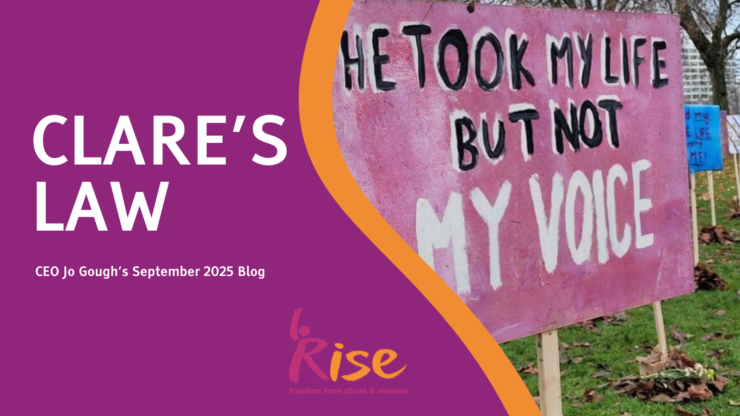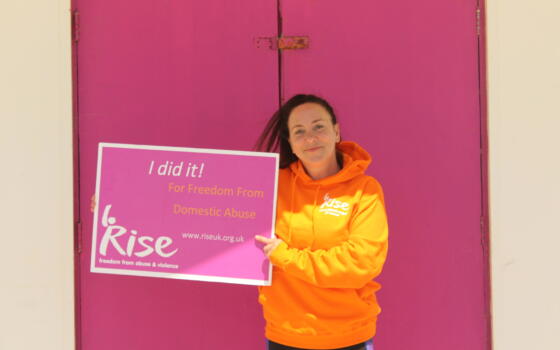Clare’s Law - more formally known as the Domestic Violence Disclosure Scheme (DVDS) - is a law which gives people the right to know if a current or ex-partner has any history of violence or abuse.
It came into force as a policy in England and Wales in 2014, in Scotland in 2016, and in Northern Ireland in 2018. International versions have been trialled. In 2021, Clare’s Law became a law, not just a policy, in The Domestic Abuse Act 2021. In 2022, the timeframe for the police to share information following a request was reduced, from 35 days, to 28.
In the year 2023/2024, 58,612 requests were made under Clare’s Law in England and Wales 24,505 of which led to disclosures. Locally, from April, 2023, to March, 2024, Sussex Police report receiving 574 right-to-know and 1,082 right-to-ask requests – an increase of 50% against the previous year.
Clare’s Law is named after Clare Wood. Clare was murdered by her ex, who had a police record of violent behaviour against women. Even after reporting multiple instances of violence by him, Clare was not told about this record due to a loophole in the Data Protection Act. Clare’s father Michael campaigned passionately to get this changed, and succeeded.
Clare’s Law applies to anyone over the age of 16 without exception. It applies to same sex or mixed sex relationships, to people of all religions and none, to all ethnicities, races, abilities and gender identities.
Claire's Law applies to all kinds of domestic abuse. The law is frequently being updated so this may change but as it stands today, this includes
- Sexual and physical violence and abuse
- Coercive control - controlling, coercive, threatening, isolating, degrading or humiliating treatment
- Psychological and emotional abuse
- Financial and economic abuse
- Stalking
- Tech, online and digital abuse
Under Clare’s Law, people have both a ‘right to ask’ and a ‘right to know’.
The right to ask means you can ask the police whether your current or ex-partner has a history of violence or abuse, if you are worried that they may be a danger to you in the future.
It also means that if you are worried that a current or ex-partner of a close friend, family member of neighbour might be a risk, you can ask about their history too.
The right to know means that the police might choose to tell you, without you asking, if they know that your current or ex-partner has a history of violence or abuse, and they believe that you might be at risk.
How do I make a request?
Sussex Police Chief Constable Jo Shiner has said, ‘“If in doubt, please ask, because by doing that you might prevent serious injury or even worse.”
Requests are made to the police. In Brighton and Hove, this can be done online, by phone or in person.
- Online. Fill in the online form on the Sussex Police Website
- By phone. Call 101 and tell them operator that you want to make a Clare’s Law - or Domestic Violence Disclosure Scheme - request
- In person. Go to a police station and ask to make a Clare’s Law - or Domestic Violence Disclosure Scheme - request
What happens next? Does the person I’m asking about know?
The person you are asking about will not know that a request has been made about them.
After your initial request has been received, the police will contact whoever has made the request with follow up questions, depending on each situation. They will usually want to confirm your ID, and understand your relationship with the person you are asking about. They will assess at this stage whether or not to proceed with the enquiry.
If they decide to proceed, they might have what’s called a ‘multi agency meeting’ with probation, the prison service or social services before deciding if any risk is present, and if a disclosure is the right thing. If you made the request for your own relationship, any disclosure would be made to you. If you asked about someone you’re worried might be at risk, you may not receive the information - it might instead be shared directly with that person.
If at any point the police believe there is a risk to safety, they are obliged to act.
Further information and getting help
- If you or someone else is in danger now, call 999.
- If you are concerned for your own on someone else’s safety in Brighton and Hove, contact us.
- More information on the law us is available on the Clare’s Law website.
- The Sussex Police have produced a Clare’s Law booklet which takes you through the procedure step by step, whether you are asking for yourself or because you are worried about someone else.


